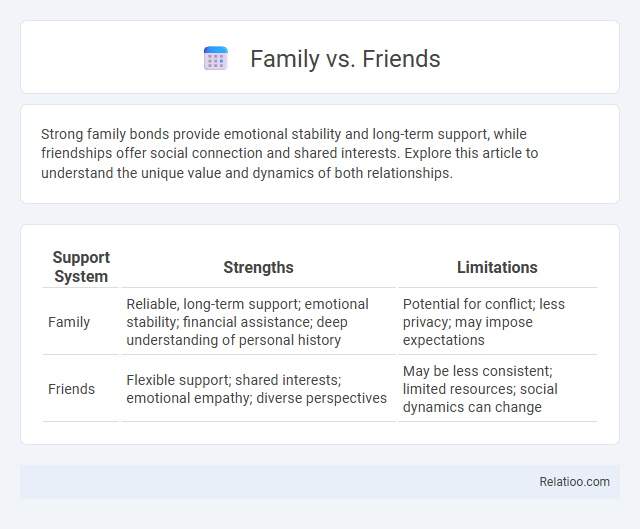Strong family bonds provide emotional stability and long-term support, while friendships offer social connection and shared interests. Explore this article to understand the unique value and dynamics of both relationships.
Table of Comparison
| Support System | Strengths | Limitations |
|---|---|---|
| Family | Reliable, long-term support; emotional stability; financial assistance; deep understanding of personal history | Potential for conflict; less privacy; may impose expectations |
| Friends | Flexible support; shared interests; emotional empathy; diverse perspectives | May be less consistent; limited resources; social dynamics can change |
Understanding the Meaning of Family and Friends
Family often represents a foundational support system based on biological or legal ties, providing unconditional love and shared history. Friends contribute chosen connections, fostering emotional support, trust, and mutual interests that enhance personal growth and social well-being. Relatability bridges family and friends by emphasizing understanding, empathy, and shared experiences that strengthen relationships beyond formal definitions.
Core Differences Between Family and Friends
Family shares genetic ties and legal bonds that create a foundation of unconditional support and long-term commitment, while friends are chosen relationships based on shared interests, values, and mutual enjoyment. The core difference lies in obligation versus voluntary connection: family often entails responsibilities regardless of personal feelings, whereas friendships thrive on reciprocity and emotional relatability. You benefit from understanding that family relationships may endure challenges due to their inherent duty, whereas friends provide flexible emotional resonance shaped by personal affinity.
The Role of Family in Emotional Support
Family plays a crucial role in providing consistent emotional support, offering a foundation of unconditional love and understanding that strengthens mental resilience. Unlike friendships, family bonds are often lifelong and deeply rooted in shared experiences, facilitating a unique sense of security and belonging. Research indicates that strong family support correlates with lower stress levels and improved emotional well-being across diverse age groups.
How Friendships Shape Our Identity
Friendships significantly shape your identity by providing diverse perspectives and emotional support that influence your values and self-perception. Unlike family ties, friendships are chosen based on shared interests and mutual understanding, fostering personal growth and self-discovery. This dynamic interaction with friends enhances your social skills and helps define your unique sense of relatability and belonging.
Loyalty: Family Bonds vs. Friendships
Loyalty often shapes the strength of both family bonds and friendships, influencing how trust and support are maintained over time. Family bonds tend to come with inherent loyalty due to shared history and blood relations, while friendships rely more on mutual respect and chosen commitment. Your ability to nurture loyalty in both areas enhances emotional resilience and deepens meaningful connections.
Conflict Resolution: Family Ties vs. Friendship Dynamics
Family ties often involve long-standing emotional bonds that can both complicate and enrich conflict resolution, as deeply ingrained expectations and shared history influence communication patterns. Friendship dynamics typically allow for more flexible boundaries and mutual understanding, facilitating easier negotiation and compromise during disagreements. Navigating conflicts requires recognizing these distinct relational frameworks to apply tailored strategies that respect the emotional investments unique to family and friends.
Trust and Dependability in Family and Friends
Trust and dependability form the cornerstone of both family and friend relationships, yet they manifest differently within each. Family members often provide unwavering support grounded in lifelong bonds and shared history, fostering a deep-seated sense of reliability. Friends, while chosen and sometimes more fluid, offer trust based on mutual understanding and relatability, emphasizing emotional connection and empathetic support.
Impact of Life Stages on Family and Friend Relationships
Life stages significantly influence the dynamics between your family and friends, shaping how support and relatability evolve over time. During childhood, family provides foundational bonds, while friendships expand social skills and personal identity. In adulthood, shifting priorities and responsibilities often change the frequency and depth of interactions, affecting how relatable and supportive these relationships remain.
Balancing Time Between Family and Friends
Balancing time between family and friends requires prioritizing quality interactions that nurture meaningful relationships. Scheduling dedicated moments for family fosters emotional support, while maintaining social connections with friends enhances mental well-being. Effective time management ensures neither sphere is neglected, promoting overall relational harmony and personal fulfillment.
Choosing Sides: Family or Friends in Difficult Situations
Choosing sides between family and friends in difficult situations often hinges on loyalty, trust, and shared history, with family providing deep-rooted support while friends offer understanding and empathy from a different perspective. The emotional stakes are typically higher in family conflicts due to long-term bonds and obligations, but friends can serve as objective mediators or allies when family dynamics become toxic or strained. Prioritizing emotional wellbeing and clear communication is essential to navigate these complex relationships without compromising personal values or mental health.

Infographic: Family vs Friends
 relatioo.com
relatioo.com